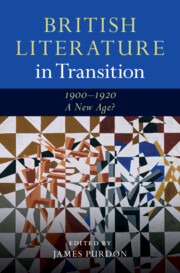Book contents
- British Literature in Transition, 1900–1920: A New Age?
- British Literature in Transition Series
- British Literature in Transition, 1900–1920: A New Age?
- Copyright page
- Contents
- Contributors
- General Editor’s Preface
- Acknowledgements
- Introduction
- Part I Nation and Empire
- Chapter 1 Aliens
- Chapter 2 Oceanic States
- Chapter 3 Passage Work
- Chapter 4 Anglo-Irish Transitions
- Chapter 5 British War Writing
- Chapter 6 Capturing Home
- Part II Media
- Part III Aesthetics
- Part IV Society
- Index
Chapter 5 - British War Writing
Empire, Mass Warfare, and Mass Culture
from Part I - Nation and Empire
Published online by Cambridge University Press: 07 December 2021
- British Literature in Transition, 1900–1920: A New Age?
- British Literature in Transition Series
- British Literature in Transition, 1900–1920: A New Age?
- Copyright page
- Contents
- Contributors
- General Editor’s Preface
- Acknowledgements
- Introduction
- Part I Nation and Empire
- Chapter 1 Aliens
- Chapter 2 Oceanic States
- Chapter 3 Passage Work
- Chapter 4 Anglo-Irish Transitions
- Chapter 5 British War Writing
- Chapter 6 Capturing Home
- Part II Media
- Part III Aesthetics
- Part IV Society
- Index
Summary
Representations of conflict in the early twentieth century respond both to the impact of mass industrial warfare, particularly in the First World War, and the development of mass culture following the Education Acts of the late nineteenth century. Concomitant with the development of literary modernism, the need to represent radically new forms of physical and mental experience reshaped war writing; a hundred years later, that influence persists. This chapter argues that war writing must be understood not simply as a response to individual conflicts; rather, the memory, expectation, and fear of war was a pervasive presence that continually shaped much of the period’s writing even in times of apparent peace, and supported a lucrative literary market in jingoistic literature, popular invasion fiction, and memoirs of wartime trauma. This chapter traces the lasting influence of the period’s major conflicts on its literary writing – particularly its prose – and concludes with a discussion of several post-war texts, published in the immediate aftermath of the First World War, which point towards the disenchanted and often angry tone of the 1928–30 War Books Boom.
- Type
- Chapter
- Information
- British Literature in Transition, 1900–1920: A New Age? , pp. 106 - 121Publisher: Cambridge University PressPrint publication year: 2021

